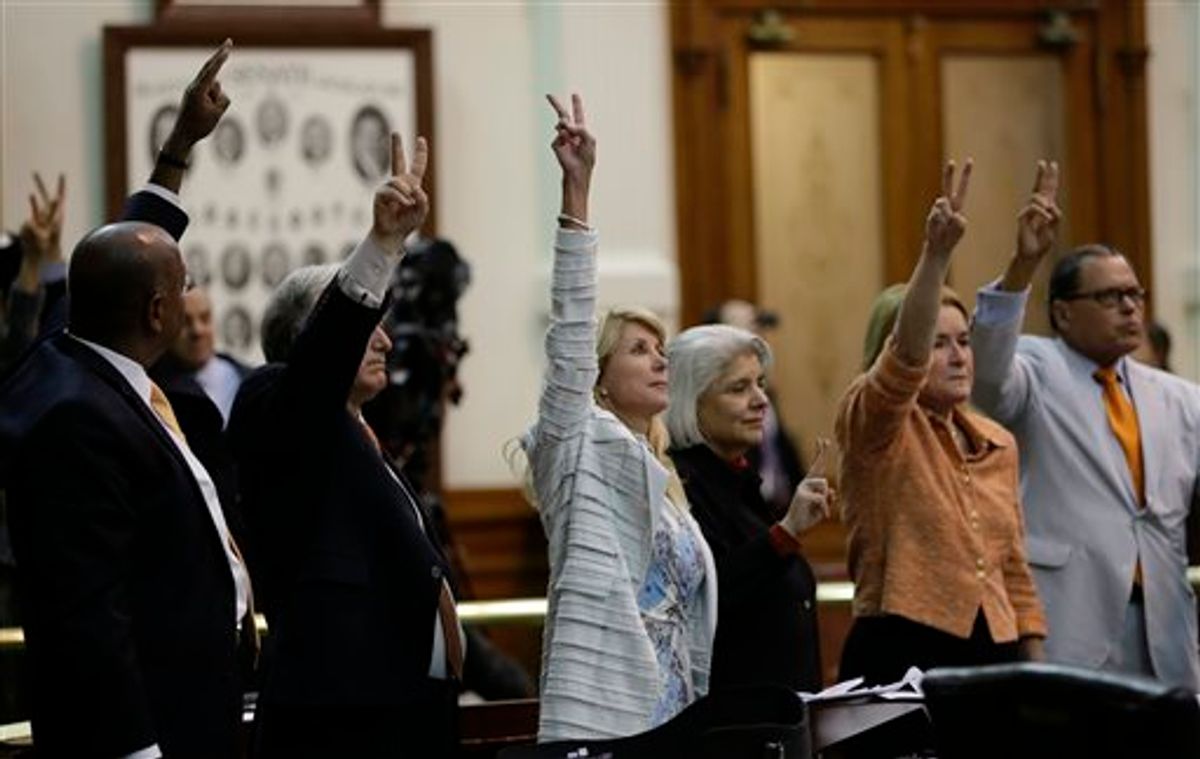Wednesday marks the one-year anniversary of Wendy Davis' historic 13-hour filibuster, a short-lived but exuberant triumph against the sweeping abortion restrictions that would soon throw Texas into a full-blown reproductive health crisis. In the ensuing 365 days, abortion services have vanished entirely from the Rio Grande Valley, clinics across the state have been forced to close their doors and thousands of Texans -- particularly low-income people of color -- have been deprived of healthcare and their constitutional rights. But in the final moments of June 25, 2013 -- as those camped out in the Capitol building chanted, "Let her speak!" and Lt. Gov. David Dewhurst scrambled to sign the measure before the midnight deadline -- the people fighting for vital medical care prevailed.
It was the work of thousands of Texans that made Davis' marathon filibuster possible, and it was their voices that helped kill SB 5. Sarah Slamen delivered testimony so powerful -- so frightening to the lawmakers pushing the bill -- that she was forcibly removed from the building. People like Tuesday Cain and her father, Billy -- who had never been part of any protest movement before -- were drawn to the Capitol to throw their support behind Davis and Leticia Van de Putte and the other people just like them who were fighting this fight. Davis heroically stood for 13 hours, but the people's filibuster sealed SB 5's fate.
Davis' filibuster showcased everything that the reproductive rights movement is at its strongest. She couldn't sit, lean, eat or drink, but she could share stories. So that's what she did. She centered the experiences of patients, she read the testimonies of people denied abortion care at a time when they needed it most. Davis talked about the disproportionate impact the restrictions would have on women already living on the margins of access. She shared the stories of people who wanted to terminate pregnancies before Roe v. Wade, providing a startling but necessary reminder about the dangers and consequences of criminalizing abortion. She uplifted the voices of rape survivors who were forced by circumstance to carry their pregnancies to term, and those of other women who said that the ability to terminate those pregnancies quite literally saved their lives. She read statements from doctors who wanted to practice medicine that served the best interests of their patients. She cited the overwhelming data and scientific evidence showing that these restrictions hurt people.
"So I was the one who took her to the clinic, held her hand and supported her in the months that followed," read one of the anonymous testimonies Davis shared. "I would have been devastated had that option not been available or affordable for her."
"Instead of choosing an outfit for her to move home, I was picking out her burial gown," read another testimony provided by a woman who had to terminate her pregnancy because of life-threatening medical complications. "I held her -- kissed her -- watched her get baptized -- told her that I loved her and I said, 'Goodbye.'"
"The entire experience was horrible, but I cannot imagine what it would be like under the circumstances that Texas now wants to make women undergo," read another, a story shared by a rape survivor who became pregnant as a result of the assault. She was able to obtain an abortion, but feared that women like her wouldn't be able to under the new law. "I made a decision to save my life: my own, and it was the most important decision I've ever made and will ever make."
This measure "places an unacceptable level of control over the doctor-patient relationship in the hands of the legislature, essentially allowing the legislature to practice medicine," read another testimony from a Texas doctor.
All too often, these aren't the voices we hear. But Davis made them her focus.
Davis did the heroic physical labor of sustaining the filibuster, but she was standing on the shoulders of a movement much bigger than herself. And that movement has only grown more powerful in the year since. The filibuster launched Davis' campaign for governor, and while it remains uncertain whether or not she will prevail in that race, the people of Texas have not stopped fighting. And it's a fight that will continue whether or not Davis turns the state blue.



Shares